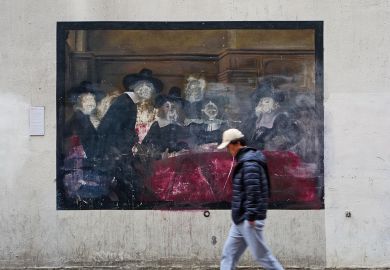Is the contemporary university too detached from the working world or already too vocationalised? It depends on who you ask. Critics see college as an increasingly shaky investment, if not an outright scam. Traditionalists retort that the real scam is reducing higher education to a pay cheque. The divide appears as wide as Silicon Valley.
In fact, however, the two camps share more than they realise. The champions of the bottom line stress “transferable skills” and marketable degrees. The humanities stalwarts point out that life, as Wordsworth saw, is about more than “getting and spending”. And indeed it is, but so is vocation. Both sides assume that vocational education is nothing more than training and credentialing. By my count, this omits no fewer than four necessary tasks of vocational formation.
The first is finding a vocation. True, most universities admit students directly into specific courses of study billed as pre-professional pathways. Surely, though, there is more to vocational discernment than ticking a box at the ripe age of 17. Young people need opportunities to wrestle with the great vocational question: what is a worthy form of work to which I am suited?
To short-circuit this process is to invite the tragedy described by John Dewey: the “failure to find one’s true business in life”. Vocational discernment is demanding. To overcome our parochialism, we need exposure to a fuller range of projects pursued and prized by human beings. To determine which are worthwhile, we must cultivate ethical judgement. And determining what suits our nature and talents requires nothing short of self-knowledge.
This is a tall order. If only we had a curriculum that exposed students to noteworthy attempts to understand what is worth striving for in a human life, with the aim of cultivating self-knowledge and practical wisdom. Of course, we already do. It is called the humanities.
Assuming that this work of discerning a genuine calling were complete, would that leave only the acquisition of the knowledge and skills needed to perform that calling’s characteristic tasks? Clearly not. That would produce only technicists, prone to mistake the clever manipulation of means for the achievement of worthwhile ends.
Thus, the second neglected but necessary task of vocational formation is to cultivate an awareness of the ethical geography in and around one’s vocation. Lapses of individual moral integrity are bad enough, but there are also cases where the integrity of practices themselves is in doubt. True vocational education nurtures practitioners who know how and when to ask questions such as: Am I a teacher or a warden? Is this journalism or entertainment? Am I a jurist or a politician? Is this a university or corporate R&D?
The final two neglected tasks take us beyond vocational preparation to consider how vocations catalyse our ongoing formation. In rich narratives of vocational enactment – such as John Berger’s A Fortunate Man, which reflects on the medical profession, or Vasili Toporkov’s Stanislavski in Rehearsal, which examines acting – we find practitioners learning not only how to pursue their craft but also how to be people.
While this is the definition of on-the-job learning, we can and must orient the young in advance to this idea: that they must learn how to grow into and through their work. To neglect this third crucial task of vocational formation is to set students up for stultification. As Bob Dylan puts it, “he not busy being born is busy dying”.
Then again, the work itself might be stultifying, regardless of our stance. Practices can get swallowed up by the institutional machinery built to sustain them. Or we may come to discover that the work was suited only to a superficial layer or a younger version of ourselves. Hence, the final task of vocational formation is to learn how to recognise and seize the moment to move on from one’s work, if and when that time comes.
In neglecting these four crucial dimensions of vocational formation, we are offering not so much an incomplete vocational education as a vocational miseducation. It is as if someone, after promising to build you a boat, delivers only a hull and stencilled nameplate, skipping a sail, compass, rudder and life preserver. This suggests that the debate over vocationalisation is misguided. The university is not really vocationalised at all, only “jobbified”.
To be sure, there are historical and contemporary exceptions to this rule. From 1933 to 1957, North Carolina’s Black Mountain College blazed a brilliant experimental path between bookishness and bookkeeping. Debating claims and declaiming poems, planting crops and sharing meals, constructing buildings and performing plays, interpreting texts and balancing budgets, students explored the “grammar of the art of living and working in the world”, as the college’s founder and first rector, John Andrew Rice, put it. And my institution, Boston College, has long seen vocational questions as central to liberal education and, indeed, to life.
So I say, rather than fret about vocationalisation, let’s embrace it wholeheartedly. When we do, we will see that it both requires and yields humane learning. A truly vocational university would be a sight to behold.
Chris Higgins is chair of the department of formative education in the Lynch School of Education and Human Development at Boston College. He develops this argument in detail in Undeclared: A Philosophy of Formative Education (MIT Press, 2024).
POSTSCRIPT:
Print headline: To champion vocational education is to advocate for the humanities
Register to continue
Why register?
- Registration is free and only takes a moment
- Once registered, you can read 3 articles a month
- Sign up for our newsletter
Subscribe
Or subscribe for unlimited access to:
- Unlimited access to news, views, insights & reviews
- Digital editions
- Digital access to THE’s university and college rankings analysis
Already registered or a current subscriber? Login








